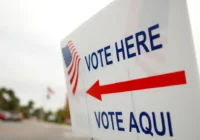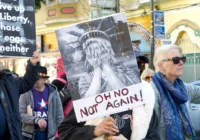Four years ago, I published Subtle Tools, a book on the erosion of American democratic norms in the face of what came to be known as the Global War on Terror. Both what had been done in the name of “national security” in response to the September 11 attacks and how it had been done — through the willing neglect of procedural integrity, the exploitation of all-too-flexible norms, a remarkable disregard for transparency and a failure to call for accountability of any sort left the country wide open to even more damaging future abuses of the rule of law.
Lo and behold, that future is all too distinctly here. What happened in the first quarter of this century is already being weaponized in a startling fashion in the second era of US President Donald Trump. In fact, the deluge of eye-opening, antidemocratic policies that we’ve witnessed in just the first 50 days of his presidency should be considered nothing short of a perverse escalation of the recent past. Think of it, in fact, as — if you don’t mind my inventing a word for this strange moment of ours — the “perversification” of War on Terror-era law and policy, which might once have been hard to imagine in this country.
While there are already all too many examples of that very sort of perversification, let me just focus on several that could prove crucial when it comes to the future of our imperiled democracy.
Rising racism
Among the numerous anti-democratic trends of this century, state-sponsored racism has been a constant concern. Of the many low points in the response to September 11, the unleashing of government policies of racial and ethnic discrimination stands out. Fearing a follow-up attack, law enforcement targeted Muslim Americans, surveilling mosques and casting a startlingly wide net of suspicion with a sweeping disregard for civil liberties. That approach was only strengthened by the militarization of police forces nationwide in the name of targeting Arabs and Muslims. In 2002, the government even introduced the National Security Entry-Exit Registration System program, a “Special Registration” requirement mandating that all males from a list of 24 Arab and Muslim countries, as well as North Korea, register and be fingerprinted. In the words of the American Civil Liberties Union, the program amounted to “a discriminatory policy that ran counter to the fundamental American values of fairness and equal protection.”
A dangerous template for discrimination based on race, religion or national origin was thereby set in place. In his first term in office, Trump promptly doubled down on that Islamophobic trend, even though his predecessor, President Barack Obama, had revoked the registration requirement. By Executive Order 13769, Trump authorized a ban on the entry into the United States of citizens from seven Muslim countries, an order that would be reined in somewhat by the courts and finally revoked by President Joe Biden.
In Trump’s first term, discrimination was not limited to those from Arab and Muslim countries. As the Costs of War project has pointed out, the Islamophobia of the War on Terror years had set a racial-profiling precedent and example for the more broadly racist policies of the first Trump administration. “The exponential surveillance since 9/11 has also intensified the criminalization of marginalized and racialized groups… and has increasingly targeted protest movements such as Black Lives Matter.” Yes, Trump did indeed go after Black Lives Matter protesters with a vengeance during his first term, even unleashing armed federal agents without insignia to tear gas, beat and detain such protesters in Portland, Oregon.
While Obama would end the Special Registration program and Biden would revoke the Muslim ban, no preventive measures were undertaken to guard against future racist policies and, all too unfortunately, we see the results of that today.
Trump 2.0 has already escalated discriminatory policies, focusing on protecting white males at the expense of people of color and women. In fact, his very first executive orders included several measures cracking down on asylum seekers and closing off legal avenues to citizenship, as well as a brazen decree aimed at eradicating diversity, equity and inclusion (DEI) throughout the country. Executive Order 14173 (“Ending Illegal Discrimination and Restoring Merit-Based Opportunity”) was issued on January 21, 2025, the very day he took office. It ordered organizations and entities — from government offices and the US military to schools, businesses and more — to end their DEI policies “within 120 days” or risk losing government funding.
Recently, making good on its threats, the Trump administration canceled $400 million of federal funding in the form of grants and contracts to Columbia University as a sign of disapproval of that university’s supposed tolerance of pro-Palestinian protests. This was, as National Public Radio reported, “described as the school’s failure to police antisemitism on campus.” Nine other universities are believed to be under similar scrutiny.
In other words, the discrimination enshrined by federal authorities in law and policy after September 11 opened the way for a far more widespread governmental embrace of racial and ethnic discrimination now underway.
Disappearing the record
Secrecy was likewise baked into the government’s response to the War on Terror, often to keep what would have been obvious abuses of the law well hidden. Whether it was the use of “enhanced interrogation techniques” — the phrase employed by the administration of President George W. Bush for acts of straightforward torture — or mass surveillance, the authorization for the targeted killing of an American citizen or the implementation of other policies that deviated from accepted law and practice, all of that and more was initially kept well hidden from the American public.
Now, many have described the brazen upheavals decreed by the Trump administration as being the very opposite of secrecy — as, in fact, “saying the quiet part out loud.” In reality, however, in these first days of his second term in office, Trump and crew have taken secrecy to a new level, replacing it with a broad policy of erasure and invisibility. In fact, despite the administration’s pledge of “radical transparency” in areas like spending, a hostile onslaught against the written record has prevailed.
This determination to bury the record was apparent during the first Trump administration. He repeatedly asserted his right, for instance, not to document his meetings with Russian President Vladimir Putin. In 2017, he reportedly confiscated notes that were taken at a meeting with Putin. In 2019, at the G-20 in Buenos Aires, he met Putin with neither a translator nor a note-taker present. The Washington Post reported that “U.S. officials said there is no detailed record, even in classified files, of Trump’s face-to-face interactions with the Russian leader at five locations over the past two years.” In other words, on a matter of top national security concern — US–Russian relations — a “cone of seclusion” was created, effectively leaving it to the two presidents to make decisions in secret. Meanwhile, in his first term in office, Trump allegedly flushed certain records relevant to the classified documents case against him down the toilet.
In his onslaught against record-keeping and the public’s right to know, the National Archives has become a prime target. Trump’s battle with the Archives had its origins in his legal struggle over the classified documents he was alleged to have kept in his possession in violation of the law after his first administration. Supposedly, he even destroyed security camera footage taken at Mar-a-Lago that showed boxes of those documents being moved. Now, the president has fired US Archivist Colleen Shogan, replacing a professional academic with Marco Rubio, despite his duties as secretary of state.
His outright refusal to keep a record of his administration’s activities is also reflected in his insistence that the records of the Department of Government Efficiency (DOGE) fall under the Presidential Records Act. This applies to the records of the president and vice president and comes with the guarantee that they can be withheld from the public for up to 12 years after he leaves office. The Act also allows for the disposal of records, pending the approval of the national archivist.
In a further example of denying information as a form of politics, Trump’s Office of Professional Management ordered the removal of gender-related content from its websites, as well as the erasure of gender-identifying pronouns from email signatures and an end to all gender-related programs and grants. This led to the removal of pages from the Census.gov website, as well as from the Centers for Disease Control and Prevention and military websites, and the replacement of the acronym LGBTQ+ with LGB. Under court order, some of these webpages have been put back up, even if with this defiant note:
“Any information on this page promoting gender ideology is extremely inaccurate and disconnected from the immutable biological reality that there are two sexes, male and female. The Trump Administration rejects gender ideology and condemns the harms it causes to children, by promoting their chemical and surgical mutilation, and to women, by depriving them of their dignity, safety, well-being, and opportunities. This page does not reflect biological reality and therefore the Administration and this Department rejects it.”
In other words, the Trump administration’s claims of legitimacy for its purge of information remain strong. The legacy of state-sanctioned secrecy and a parallel burying of the record, inextricably tied to the post-September 11 era, has already found a secure footing in the second Trump presidency.
Undermining the courts and the law
Time and again in the War on Terror, the Department of Justice and the courts deferred to the federal government in the name of national security. As a 2021 Brennan Center report noted, national security deference was apparent in decisions not to hear cases due to “state secrets” claims, as well as in decisions that prioritized over civil liberties guarantees and human rights considerations what government lawyers argued were the constitutionally granted powers of the president in national security matters.
Under Trump the second time around, it’s already clear that there’s going to be a full-scale assault on the legitimacy of the legal system. Witness the administration’s attacks on judges whose decisions have gotten in the way of his agenda. When a judge ordered the restoration of public health data that had been removed from government websites, he was summarily castigated by billionaire Elon Musk as “evil” and someone who “must be fired.” Meanwhile, the Department of Justice has already moved to squelch independent decision-making by immigration court judges, threatening them with nothing short of dismissal should they rule against the president’s prerogatives.
Then there are the attacks on law firms that have opposed Trump. Recently, security clearances were removed for lawyers at the law firms of Perkins Coie, which represented presidential candidate Hillary Clinton’s campaign in the 2016 election; and Covington Burleigh, which represented Jack Smith, who investigated Trump in the Biden years. Lawyers from those firms were also banned from federal buildings. And don’t forget the all-out attempt to go after officials who investigated and prosecuted January 6 cases.
The idea of an independent Justice Department has been severely damaged, with the promise of so much more to come.
Evading accountability
More often than not, the significant transformations of law and policy that grew out of the response to September 11 were relegated to the pages of history with little or no accountability. The Senate, under Senator Dianne Feinstein’s leadership, did produce a report on the CIA’s use of torture. It detailed despicable acts of cruelty and ultimately concluded that such techniques, decreed to be legal by the Department of Justice, were “not an effective means of acquiring intelligence or gaining cooperation from detainees.” And immediately upon taking office in 2009, Obama issued an executive order officially ending the use of torture. But he was decidedly against holding any officials accountable for what had occurred, preferring, as he so memorably put it, to “look forward instead of looking backward.” In addition, Obama refused to call torture a “crime,” labeling it a mistake instead.
Today, in more mundane matters, the distaste for accountability has been institutionalized throughout the government. In his first term in office, Trump dismissed or replaced five inspectors general, officials assigned to departments throughout the executive branch of government to monitor waste, abuse and fraud. Almost immediately upon taking office this time around, he dismissed “roughly 17” of them. For the moment, Musk’s DOGE, which, from its creation, never included an inspector-general position, is now under review by the Department of Treasury’s inspector general.
Trump’s aversion to accountability clearly reflects a desire to protect his own efforts to totally control executive policy. It should, however, also serve as a striking reminder of the aversion to accountability that followed the legalization and uses of torture in the post-September 11 years, the allegedly fabricated decision to go to war in Iraq, the mass surveillance of Americans in that era and so much more. All of this set in place a grim template for the second Trump era: the notion that no one is ultimately accountable for abusing the law when their actions have been ordered (or simply approved) by the president.
Lessons (un)learned
Given the magnitude of the most recent antidemocratic actions by Trump and his team, blaming them on the slippery slope created during the War on Terror years may seem like a distinct overreach. Yet, given the dangerous excesses we’re now witnessing, it’s worth remembering just how vulnerable the loss of certain norms of legality and accountability in those years left this country — and how sadly little we seem to have learned from that era.
Racism, a lack of deference for the courts, the failure to hold individuals and organizations accountable for informally rewriting the nation’s laws, the pervasive embrace of secrecy and an unwillingness to erect strict guardrails to prevent the future manipulation of both laws and norms — all those realities of the War on Terror years created a distinctly undemocratic template, however different in scale, for this Trumpian moment of ours. An unwillingness to be accountable or to circumvent secrecy during the War on Terror led the country straight into today’s quagmire.
Today’s horrific moment should, in fact, be considered — to return to that word of mine one last time — a true perversification of past misdeeds, made all too possible by a failure in the post-September 11 years to take measures to prevent their recurrence.
[TomDispatch first published this piece.]
[Lee Thompson-Kolar edited this piece.]
The views expressed in this article are the author’s own and do not necessarily reflect Fair Observer’s editorial policy.
Support Fair Observer
We rely on your support for our independence, diversity and quality.
For more than 10 years, Fair Observer has been free, fair and independent. No billionaire owns us, no advertisers control us. We are a reader-supported nonprofit. Unlike many other publications, we keep our content free for readers regardless of where they live or whether they can afford to pay. We have no paywalls and no ads.
In the post-truth era of fake news, echo chambers and filter bubbles, we publish a plurality of perspectives from around the world. Anyone can publish with us, but everyone goes through a rigorous editorial process. So, you get fact-checked, well-reasoned content instead of noise.
We publish 2,500+ voices from 90+ countries. We also conduct education and training programs
on subjects ranging from digital media and journalism to writing and critical thinking. This
doesn’t come cheap. Servers, editors, trainers and web developers cost
money.
Please consider supporting us on a regular basis as a recurring donor or a
sustaining member.
Will you support FO’s journalism?
We rely on your support for our independence, diversity and quality.










Comment